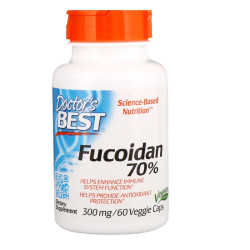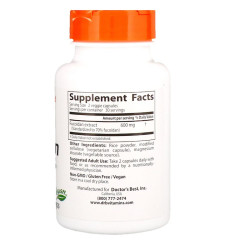
What is Fucoidan?
Bioactive complex polysaccharide found in in many species of brown seaweeds such as kelp, bladderwrack and alaria. The name fucoidan (pronounced foo-koy-den) refers to a group of complex carbohydrates, called sulphated polysaccharides which are found in the cell walls. For the past decade, fucoidans have been studied extensively for their health benefits, ranging from helping the body recover from minor illnesses to protecting the body from major diseases.
Fucoidan History:
Fucoidan is a relatively new discovery, but the seaweeds that it comes from have been in common diet at least since the 17th century. The people of Okinawa, Japan have been consuming fucoidans for centuries, enjoying brown seaweeds as part of their daily diet. Okinawa is classified as a blue zone, where people have the healthiest lives and the highest life expectancies in the world.
Health benefits:
Research on fucoidans has advanced to demonstrate extraordinary health properties, such as:
Anti-cancer
Anti-coagulant
Anti-inflammatory
Immune-enhancing
Anti-cancer:
The global search for a cancer cure is now heading towards natural treatments, both as the main pathway or in supportive care. Fucoidans protect against cancer by targeting cells that are involved in programmed cell death, which works by killing the cancer cells without triggering inflammation (2015).
The remarkable effects of fucoidan were recently demonstrated in Japan (2017), where researchers supplemented the diets of 20 cancer patients with fucoidan for 4 weeks. After just 2 weeks, it was found that the main pro-inflammatory markers associated with cancer had been significantly decreased. These findings indicate a promising approach for fucoidans as supportive care for cancer patients undergoing chemotherapy, or other treatments. By working alongside traditional medications, including chemotherapy, fucoidan makes the treatment more effective at lower doses, which can reduce the toxic side effects.
Anticoagulant:
Heparin is a highly sulphated polysaccharide, found in mammalian tissues, that has been used as an anticoagulant drug for more than 50 years. As fucoidan shares the same sulphated polysaccharide structure as Heparin, it has been used as a natural alternative for blood thinners (1998).
Anti-inflammatory:
Fucoidans can inhibit pro-inflammatory markers in the body. Researchers in Korea found that fucoidan may offer therapeutic potential for treatment of neurodegenerative diseases such as Alzheimer’s, Parkinson’s and Huntington’s diseases.
Immune-enhancing:
Research conducted on elderly Japanese men and women found that a supplement of fucoidan improved their immune response to a seasonal flu vaccine (2013). This could have a huge benefit on the health of Ireland's elderly, particularly in nursing homes and hospitals.


